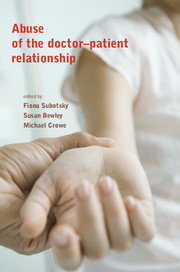Book contents
- Frontmatter
- Contents
- List of figures, tables and boxes
- List of contributors
- Foreword
- Introduction: mapping the territory
- 1 The ethical importance of boundaries to intimacy
- 2 The patient's perspective: impact and treatment
- 3 Teaching ethics and ethical behaviour to medical students
- 4 With the benefit of hindsight: lessons from history
- 5 The prevalence of boundary violations between mental health professionals and their clients
- 6 Psychiatry: responding to the Kerr/Haslam Inquiry
- 7 The general practitioner and abuse in primary care
- 8 Boundaries and boundary violations in psychotherapy
- 9 Sexual therapies: ethical guidelines, vulnerabilities and boundaries
- 10 Obstetrics and gynaecology: a special case?
- 11 Nurses as abusers: a career perspective
- 12 Medical management: governance and sexual boundary issues
- 13 Dealing with offending doctors: sanctions and remediation
- 14 Defending doctors: the protection society's experience
- 15 Regulation and its capacity to minimise abuse by professionals
- 16 The role of the General Medical Council
- Appendix 1 Extract from Vulnerable Patients, Safe Doctors
- Appendix 2 Codes of ethics of psychiatric associations in other countries
- Appendix 3 Guidance from the Council for Healthcare Regulatory Excellence
- Appendix 4 Examples of determinations by the General Medical Council's Fitness to Practise panels
- Appendix 5 Website resources and information
- Index
- Plate section
1 - The ethical importance of boundaries to intimacy
Published online by Cambridge University Press: 02 January 2018
- Frontmatter
- Contents
- List of figures, tables and boxes
- List of contributors
- Foreword
- Introduction: mapping the territory
- 1 The ethical importance of boundaries to intimacy
- 2 The patient's perspective: impact and treatment
- 3 Teaching ethics and ethical behaviour to medical students
- 4 With the benefit of hindsight: lessons from history
- 5 The prevalence of boundary violations between mental health professionals and their clients
- 6 Psychiatry: responding to the Kerr/Haslam Inquiry
- 7 The general practitioner and abuse in primary care
- 8 Boundaries and boundary violations in psychotherapy
- 9 Sexual therapies: ethical guidelines, vulnerabilities and boundaries
- 10 Obstetrics and gynaecology: a special case?
- 11 Nurses as abusers: a career perspective
- 12 Medical management: governance and sexual boundary issues
- 13 Dealing with offending doctors: sanctions and remediation
- 14 Defending doctors: the protection society's experience
- 15 Regulation and its capacity to minimise abuse by professionals
- 16 The role of the General Medical Council
- Appendix 1 Extract from Vulnerable Patients, Safe Doctors
- Appendix 2 Codes of ethics of psychiatric associations in other countries
- Appendix 3 Guidance from the Council for Healthcare Regulatory Excellence
- Appendix 4 Examples of determinations by the General Medical Council's Fitness to Practise panels
- Appendix 5 Website resources and information
- Index
- Plate section
Summary
Introduction
Sometimes you accept an invitation with a mixture of enthusiasm and trepidation, as was the case when I was approached to contribute to this volume. Just as you might relish a dinner party invitation when you know and like the other guests and feel that you have some interesting stories to tell, so as an academic I relish joining with others to explore a shared interest, particularly when my expertise is recognised and acknowledged. It is much more daunting to go to a dinner party when you know only the hostess, and the other guests come from her world rather than yours. Similarly, it is challenging to address the readers of this book, an expert audience, on a topic about which they have medical knowledge and expertise I do not share. As in the dinner party analogy, I can only hope to come up with some good stories to share, and a level of common understanding that will help the evening go well.
On this occasion, my perspective is that of an ethicist with a particular interest in the experience of healthcare professionals who operate in morally complex areas (Alderson et al, 2002; Ehrich et al, 2007). My work is also informed by my earlier academic career in which I studied and taught political philosophy, and by my personal experience as a woman growing up riding the second wave of British feminism. I have not experienced the type of therapeutic relationship upon which I will reflect, and ask for understanding of my necessarily lay perspective. It is for readers to judge what happens when they fill in the gaps with their own experiences, as therapist or client.
The therapeutic relationship
Relationships between consenting adults have generally been deemed a core component of our private lives. As such, in a liberal democratic society, they remain largely outside the reach of the state and its laws. Certain relationships become formalised and legitimised through the intervention of courts and registrars, but the way in which those relationships are subsequently conducted remains profoundly private.
- Type
- Chapter
- Information
- Abuse of the Doctor-Patient Relationship , pp. 7 - 14Publisher: Royal College of PsychiatristsPrint publication year: 2010

